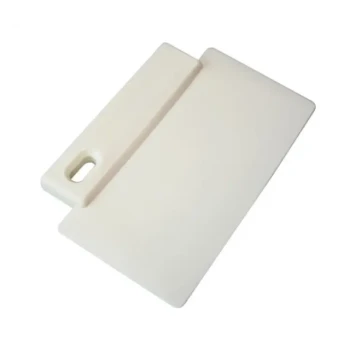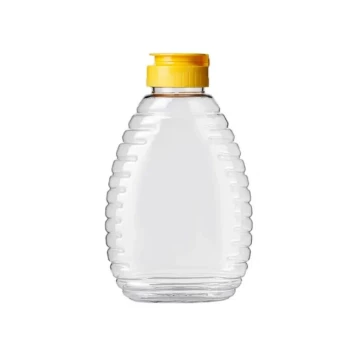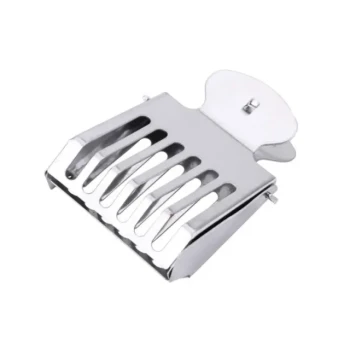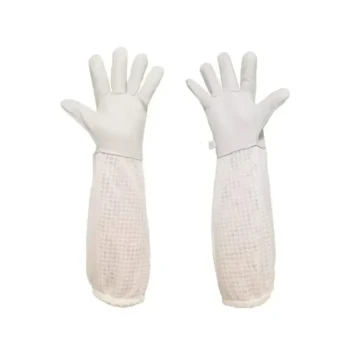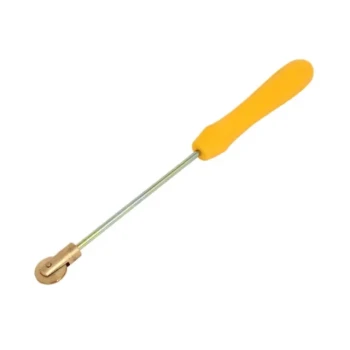In short, the primary advantages of plastic foundation are durability, reusability, and resistance to pests. Unlike traditional beeswax foundation which can be fragile and susceptible to damage, plastic provides a rigid, long-lasting structure that can withstand rough handling, high-speed honey extraction, and attacks from pests like wax moths and mice.
The decision between plastic and beeswax foundation is not about which is universally "better," but which is better aligned with your operational goals. Plastic foundation prioritizes long-term efficiency, durability, and cost-effectiveness, making it a strategic choice for many modern beekeepers.
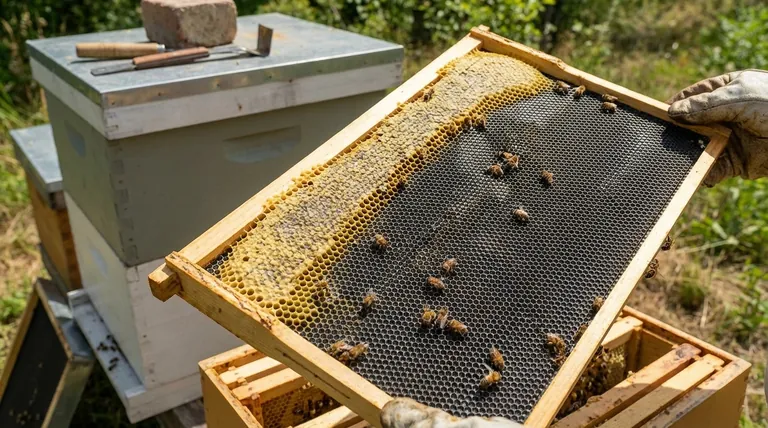
The Core Advantages of Plastic Foundation
Plastic foundation's benefits are centered on its physical properties, which solve many of the practical challenges associated with traditional beeswax.
Unmatched Durability and Strength
Plastic foundation is exceptionally rigid. This strength prevents "blowouts," where the comb collapses inside a honey extractor spinning at high speed.
This durability also means frames are far less likely to break or warp during hive inspections, reducing stress on both the beekeeper and the bees.
Long-Term Cost-Effectiveness
While the initial purchase price may be higher, plastic foundation can be reused for many years. After honey is extracted, frames can be scraped clean and placed back in the hive.
This reusability significantly lowers the cost per frame over its lifespan, making it a financially sound investment, especially for beekeepers managing multiple hives.
Superior Pest and Damage Resistance
Wax moths are a significant threat that can devastate stored beeswax combs. Plastic foundation is immune to them.
Mice can also cause severe damage to stored beeswax sheets, but they cannot chew through the hard plastic, protecting your equipment during the off-season.
Simplified Storage and Handling
Beeswax foundation is sensitive to temperature. It can become brittle and crack in the cold or warp and sag in the heat.
Plastic foundation is stable across all temperature ranges, allowing for simple, worry-free storage at any time of year.
Bridging the Gap: The Importance of a Wax Coating
While physically superior, bare plastic is unnatural to bees. A coating of beeswax is critical to ensure bees accept the foundation and begin building comb on it.
Why Beeswax Coating is Essential
Bees are far more likely to draw comb on a surface that has the familiar scent and texture of real beeswax. The wax layer makes the plastic foundation more appealing and encourages faster work.
Most plastic foundations on the market today come pre-coated with a layer of beeswax for this very reason.
Pre-Coated vs. DIY Coating
Buying pre-coated foundation is the easiest method. However, some beekeepers find that applying an extra, heavier coat of wax can further increase the speed of comb construction.
You can apply wax yourself by using a paint roller with melted beeswax or by quickly dipping the plastic sheets into a hot mixture of wax and water.
Understanding the Trade-offs
Opting for plastic foundation is not without its considerations. Being aware of the downsides is key to making an informed decision.
Slower Initial Bee Acceptance
Even when coated with wax, some colonies may be slower to draw comb on plastic compared to pure beeswax foundation. The natural material is simply what they are programmed to work with.
The "Plastic in the Hive" Debate
For beekeepers who prioritize a completely natural approach, introducing plastic into the hive environment is a significant philosophical con. While the bees interact primarily with the wax they build, the underlying structure is still man-made.
Potential for Higher Upfront Cost
A single sheet of plastic foundation is often more expensive than a single sheet of beeswax. The cost savings are only realized over time through reuse, which may not be a factor for a beekeeper with only one or two hives.
Making the Right Choice for Your Apiary
The best foundation is the one that fits your beekeeping philosophy, budget, and time constraints.
- If your primary focus is operational efficiency and scale: Wax-coated plastic foundation is the superior choice for its durability, pest resistance, and long-term cost savings.
- If your primary focus is a natural, traditional approach: Pure beeswax foundation remains the standard, offering the most natural environment for your bees despite its fragility.
- If you want a balance of durability and bee acceptance: Heavily wax-coated plastic foundation offers the most effective compromise between modern efficiency and natural bee behavior.
Ultimately, both options can lead to healthy hives and successful honey production once the comb is fully drawn out.
Summary Table:
| Advantage | Key Benefit |
|---|---|
| Durability | Prevents blowouts in extractors; withstands rough handling. |
| Cost-Effectiveness | Reusable for years, lowering long-term costs for multi-hive operations. |
| Pest Resistance | Immune to wax moth and mouse damage during storage. |
| Storage Stability | Temperature-resistant; won't warp or crack like beeswax. |
Ready to enhance your apiary's efficiency and durability?
For commercial apiaries and equipment distributors, HONESTBEE's wholesale-focused operations provide the high-quality, wax-coated plastic foundation you need for long-term success. Our durable supplies are built to withstand the demands of large-scale beekeeping, saving you time and money.
Contact HONESTBEE today to discuss your wholesale needs and discover how our equipment can benefit your operation.
Visual Guide
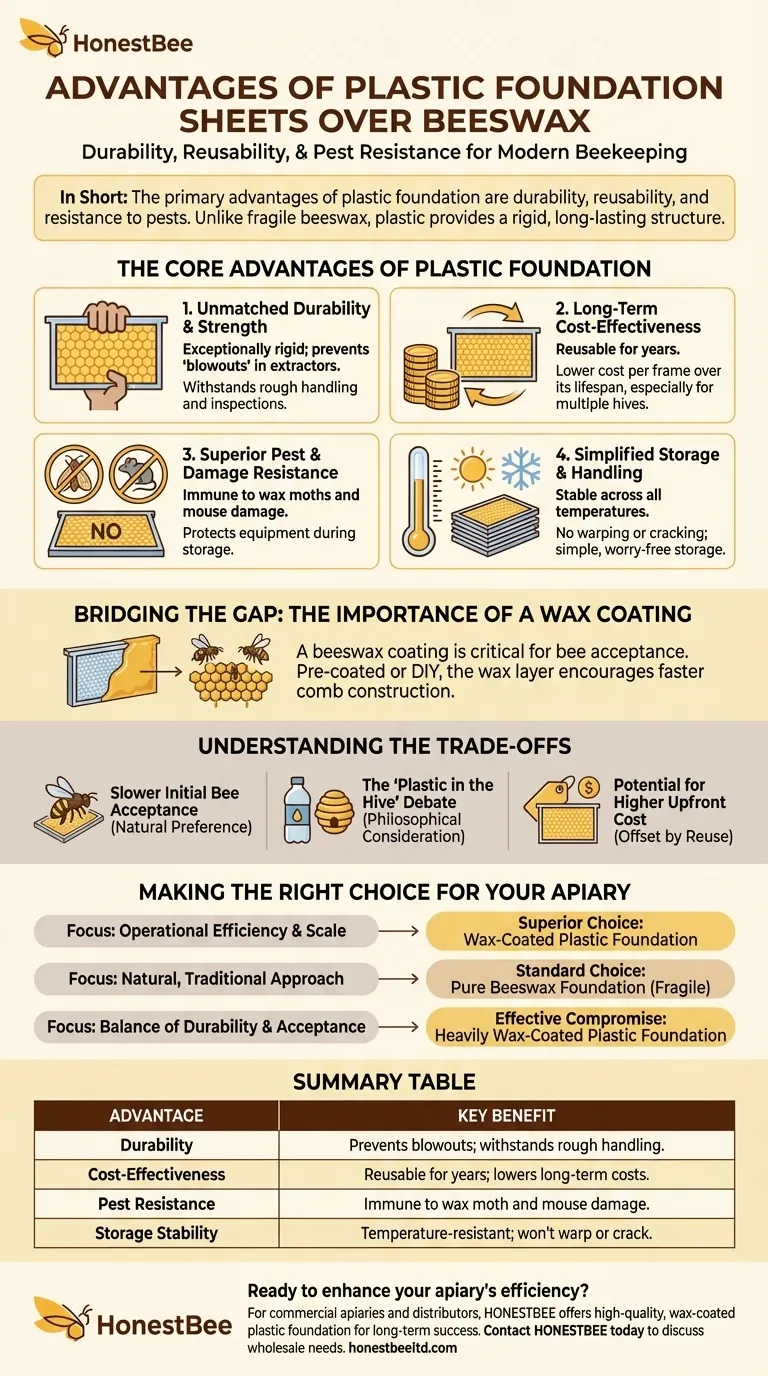
Related Products
- Food Grade Plastic bee Foundation for Bee Frames
- White PVC Beekeeping Shoes with Non-Slip Safety Sole
- High Performance Plastic Queen Excluder for Beekeeping and Apiary Management
- JZBZ Type Wide Base Plastic Queen Cell Cups for Base Mounting and Queen Rearing
- Professional Engraved Round Hive Number Tags for Beekeeping
People Also Ask
- What are the pros and cons of using plastic foundation in beehives? A Guide for Modern Apiaries
- What is the function of beeswax-coated plastic foundations in observing honeybee grooming? Enhancing Research Accuracy
- What are the specific advantages of using black foundation in a brood box? Enhance Egg Visibility & Hive Inspections
- Why have many beekeepers migrated from wooden frames to plastic frames? Boost Durability & Efficiency
- How can the acceptance of plastic hive foundation by bees be improved? Boost Acceptance with These Practical Wax Tips
- What methods can be used to coat plastic foundation sheets with beeswax? Optimize Your Hive Acceptance
- Why are new frames with plastic foundation preferred for chemical purity? Ensure Clean Baselines & Colony Health
- Why is the use of pesticide-free beeswax coating essential for plastic foundations? Ensure Hive Health and Acceptance






